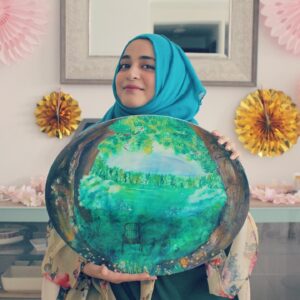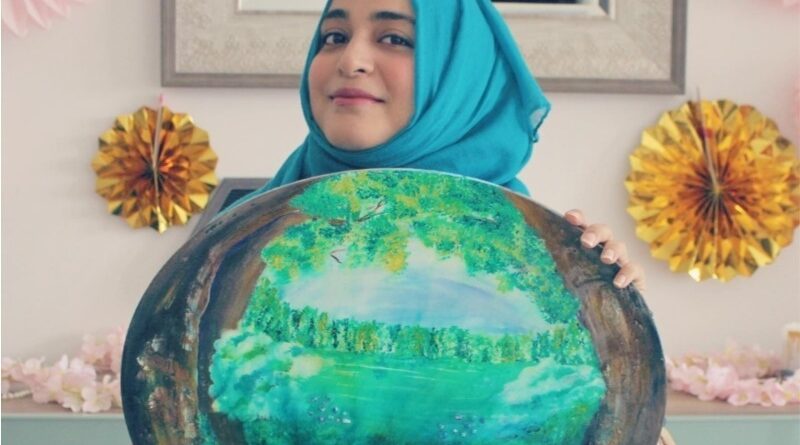You’re an artist, as well as a writer. How did these two professions complement each other for you? Do tell us about your journey in both.
My art and my writing share a similar creative process. I start with the seed of an idea, I define which medium I want to narrate the story in, what voice the story embodies, and what message I’m trying to convey. My love for speculative fiction from the subcontinent tends to seep into both my art and my writing as well—you’ll always find a hint of the fantastical or mystical in them.
As far as the journey goes, they took two entirely different paths. I’ve been writing since I was a kid—but living in places like Karachi and Jeddah where the publishing scene was not so transparent—I didn’t think to pursue it professionally until 2019 when I won the Salam Award and discovered a community that could guide and mentor me through the ins and outs of the publishing world. I’m now writing my first novel, and writing short stories in the interim.
As for my art, I never really had any confidence in my abilities as a child. I only began to dabble in it as a self-taught hobbyist after I needed therapeutic relief as a young mother of two. That developed into studying MA Fine Art Digital at the University of the Arts London, under the mentorship of a great teacher, an award for my thesis project, a whole new direction as an artist, and a lot of newfound faith in my capabilities. I’m now working on a series of digital work, as well as setting up my own shop.
On your blog, you mentioned that the publishing scene was not ideal in Jeddah, or even Pakistan. How did you overcome these challenges? What kept you going?
Yes, I feel that the path to publishing is not very clearly laid out in either of these places. Jeddah lacks even local libraries, and local bookstores don’t provide a diversity of books, so publishing in English is a farfetched concept. In Pakistan, I know there is a literary circle but I think it is difficult to find a gateway into it, and I think the market for speculative fiction is a little lacking.

Kehkashan Khalid
I kept going because, initially, I was only writing for myself. I had no intention of publishing my work, nor any belief that my work deserved an audience. It was only after my exposure to the Salam Award that I realized writing short fiction and submitting it to international magazines was a great way for a writer to get their career started. And then, of course, I had to learn to deal with rejection, writers block, imposter syndrome and teach myself to write despite them.
Now, I feel excited to say that, alongside the founder of the Salam Award, Tehseen Baweja, I’m working on a new speculative fiction magazine open to all writers of South Asian descent. It is called Tasavvur—our first issue is out and we’re getting ready to put out the second issue. We hope that it will provide a platform to the writers who are trying to find their way.
You won the Salam Award for a story at the age of 29, you had mentioned. I think you mentioned that the story ‘poured out of you’. Do tell us more about this, and how you kept up the determination to continue writing.
This was back in July 2019. I had just graduated from a rigorous two years Masters program—made even more rigorous by the fact that I had just given birth to my third baby, and subsequently fallen ill with pancreatitis. It felt like the culmination of a long journey, and I was quite ready to take a small respite from art. So I decided to write instead. I realized that the deadline for the Salam Award was approaching in a week’s time and I decided to treat that as my motivation to write. At that time, I’d been experimenting with encasing objects in resin, and that inspired the idea for the story as well. I had never been published, I only had a week to put out a story, I had never received any sort of critique on my writing. What did I have to lose? I simply had no fear of failure. I sat down, and began to write with nothing holding me back.
Which authors have inspired you in this journey?
As a child and a young adult, I was inspired by a lot of western writers including Robin Hobb, Neil Gaiman, N.K Jemisin, Phillip Pullman, among others. When I used to write I could sense those Western influences in my writing—I struggled to bring South Asian elements to the fore in speculative fiction. Later, I discovered some amazing South Asian writers and reading them helped me develop my voice and my understanding. Those include, Usman T. Malik, Vajra Chandrasekara, Amal Singh, Sameem Siddiqui, Prashanth Srivasta, Shiv Ramdas, Fatima Taqvi, Arula Ratnakar, to name a few.
Other than that, there are some other short fiction writers whose works I love: A. T. Greenblatt, Aimee Ogden, Aliette de board, Saladin Ahmed, Suzanne Palmer among others.
What is your message for aspiring writers?
I’m just going to quote my favorite book about the art-making process, ‘Art and Fear’, and say, “Art is all about starting again”. No matter how many acceptances, rejections, or awards you accumulate, to continue being a writer you must sit down and write every single time. Failure means you didn’t get there yet, but quitting means you’ll never get there at all. It’s very important to navigate past the fears, and the failures, and find a way to keep moving forward.
An aspiring author, journalist and history graduate, Lakshana Palat has written stories for three anthologies ‘When They Spoke’, ‘Mocktales’ and ‘Readomania’s Book Of Romance’. In 2018, she published her first book, ‘The Final Word’.











